

Applicants from Other States (Interstate Reciprocity):Preparation Pathways:OTI:NYSED. Standards of Learning (SOL) and Testing. Your browser does not support JavaScript!
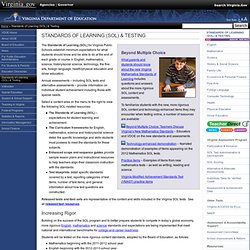
This site uses JavaScript but is fully functional without it. The Standards of Learning (SOL) for Virginia Public Schools establish minimum expectations for what students should know and be able to do at the end of each grade or course in English, mathematics, science, history/social science, technology, the fine arts, foreign language, health/physical education and driver education. Annual assessments – including SOL tests and alternative assessments – provide information on individual student achievement including those with special needs. Select a content area on the menu to the right to view the following SOL-related resources: The Standards of Learning (SOL) – expectations for student learning and achievement. Released tests and item sets are representative of the content and skills included in the Virginia SOL tests. Increasing Rigor Students will be tested on the more rigorous content standards, adopted by the Board of Education, as follows:
Grad School: Social Studies 619. Beginning of the School Year. Class Holiday Projects. Alaskan Literature Class. Classroom Behavior Managment. Military Kids. Games. Curriculum B - EL Lesson Planning. Organizing the Classroom Space. Engaging Students. Professional Development. Lesson Planning Tools. Subject or Grade Specific. Organization and Time Management. Home-School Connection Resources. Education Technology. Family Game Night "Minute To Win It" Five Classroom Rules. Jeff Battle, Director, North Carolina Whole Brain Teachers jkbattle@gmail.comThis e-mail address is being protected from spambots.
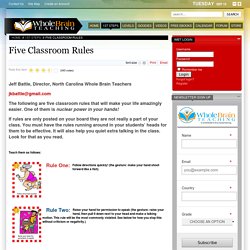
You need JavaScript enabled to view it The following are five classroom rules that will make your life amazingly easier. One of them is nuclear power in your hands! If rules are only posted on your board they are not really a part of your class. Teach them as follows: In elementary school, rehearse the rules first thing in the morning, after lunch and after each recess. Rule Two will be the most commonly violated, duh. Every kid in your class should repeat rule two energetically with gestures.
Rule Five is nuclear power. If a student complains that they don’t know how to make you happy, tell them that following the first four rules will be just dandy. Rule Five has no loophole. If parents ask why their child should worry about making you happy, respond that you have the responsibility to teach their child and every other child in that class. Grants Alaska Regional Office. About the Grants Program Office Alaska Program Office Staff: Jenn Hall-Brown and Shawn Carey The Grants Program Office of the National Marine Fisheries Service (NOAA Fisheries), Alaska Region administers a broad range of financial assistance and program partnership activities directed at supporting the core mission of NOAA Fisheries.
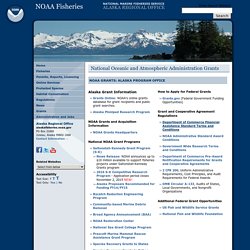
The Program Office is a component of the Operations and Management Division (OMD) of the Alaska Regional Office in Juneau, and is supported by technical staff from the Regional Office and the Alaska Fisheries Science Center. Each year OMD's grant staff initiates 30-40 new grants. Three Dimensions. The National Research Council's (NRC) Framework describes a vision of what it means to be proficient in science; it rests on a view of science as both a body of knowledge and an evidence-based, model and theory building enterprise that continually extends, refines, and revises knowledge.
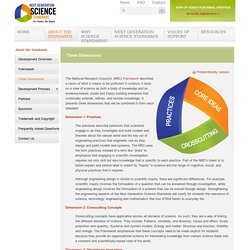
It presents three dimensions that will be combined to form each standard: Dimension 1: Practices The practices describe behaviors that scientists engage in as they investigate and build models and theories about the natural world and the key set of engineering practices that engineers use as they design and build models and systems. The NRC uses the term practices instead of a term like “skills” to emphasize that engaging in scientific investigation requires not only skill but also knowledge that is specific to each practice. Barbara's Biography. She has appeared on Oprah, CBS, NBC, ABC, CNN and NPR and has been featured in the New York Times, Time, U.S.

News & World Report, Newsweek, and other national and international publications. Her uniquely effective parenting and teaching strategies were developed through her years of training in sociology, special education, and philosophy, as well as field-tested through her experiences as a classroom teacher, laboratory school instructor, university instructor, seminar leader, volunteer in Rwanda, and mother of three grown children. She is the author of four international bestsellers: kids are worth it! Giving Your Child the Gift of Inner Discipline; Parenting Through Crisis—Helping Kids in Times of Loss, Grief and Change; The Bully, the Bullied, and the Bystander—From Pre-School to High School, How Parents and Teachers Can Help Break the Cycle of Violence; and Just Because It’s Not Wrong Doesn’t Make It Right—From Toddlers to Teens, Teaching Kids to Think and Act Ethically.
Home Page. Search Performance Expectations. Skip to main content Search form Go to the signup form > Search Performance Expectations You can also view DCI arrangements or topical arrangements of standards.
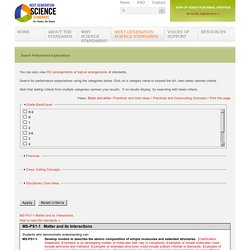
Search for performance expectations using the categories below. Note that adding criteria from multiple categories narrows your results. Topical Arrangements of Standards. Skip to main content NGSS Search the Standards To learn more about the standards and to view the NGSS Appendices, click here.
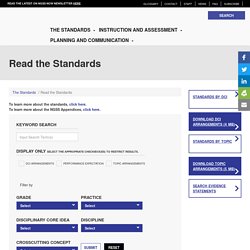
Whole Brain Teaching 7th Graders Run Wild With Disguise Cream! Whole Brain Teaching (Power Teaching) Lesson 3.